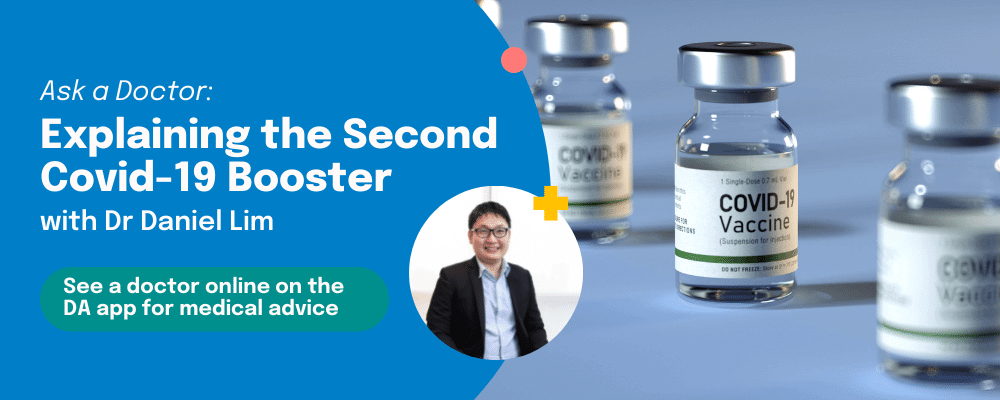
The Multi-Ministry Taskforce recently expanded the age range of individuals recommended for a second Covid-19 booster shot to all aged 60 and above. The purpose of the updated recommendation is to ensure our population stays protected against Covid-19, as vaccine effectiveness may wane over time.
Most of us would already have completed our first booster shot. The experience of doing your second Covid-19 booster shot will be pretty similar. Nevertheless, we speak with Dr Daniel Lim, a General Practitioner at Doctor Anywhere, on what to expect for your second Covid-19 booster.
A second booster bolsters our defence against a future Covid-19 wave.
“Local evidence has shown that a second mRNA booster can provide added protection and reduce the risk of serious illness by up to 50% for those aged 60 and above,” says Dr Daniel. You should get your second booster at least 5 months after your first booster shot, to ensure that your immunity doesn’t wane.
More than just protecting yourself, getting your booster shot also supports the larger community. Dr Daniel shares, “Minimising the cases of serious illness helps to prevent our healthcare system from being overwhelmed in the event of any future waves of Covid-19 infections.”
Eligible individuals can walk into any Joint Testing and Vaccination Centre (JTVC) to get vaccinated.
Getting your second booster shot is pretty convenient. So long as you’re within the recommended age range, you can walk into any JTVC to get vaccinated during their opening hours. Find the closest vaccination to your home here.
Mobile vaccination services are also available if it is inconvenient to move around. An updated timetable of timings and locations can be found here.
It is safe to do a second booster shot.
For those who are worried about the safety of the booster shot, there is little cause for concern. “MOH has conducted extensive research to ensure that a second booster shot is safe and appropriate for older adults before making the recommendation,” assures Dr Daniel. This research includes surveying both international studies as well as looking at local data.
You can expect some side effects after vaccination, but these tend to be relatively minor. Dr Daniel affirms this, saying, “Adverse side effects associated with a second booster at this age group have been mild and manageable. Allergic reactions or severe effects, such as heart inflammation (also known as myocarditis) are extremely rare.”
Any side effects you experience should improve after a few days.
“Your side effects may be similar to what you had experienced when you did your primary vaccination or first booster shot,” says Dr Daniel. Common ones include a mild fever, fatigue, and pain at the injection site. These side effects tend to resolve on their own within 48 – 72 hours.
To speed up your recovery, Dr Daniel shares the following advice:
- Get quality rest: Try not to have anything scheduled on the same day of your vaccination, so that you can head home immediately to sleep it off.
- Stay adequately hydrated: Have a water bottle with you throughout the day to make it easy to drink up.
“Additionally, you can also self-medicate with paracetamol if you’re feeling unwell or consult a doctor on the DA app for extra medical support and medication.”
Even as it seems like we’re approaching the tail-end of the current Covid-19 wave, we can’t let our defences down. The second booster shot ensures that immunity within the community is sustained, allowing us to guard against future resurgences of the virus.
If you’re still feeling nervous about your booster shot, speak to a doctor to find out more about your suitability. Check in with any of our doctors on the DA app, whenever you need, to get personalised medical advice.















